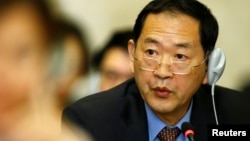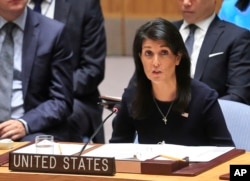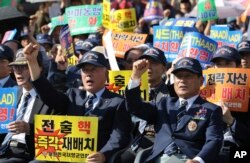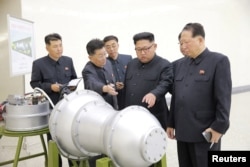North Korea has issued a new message of defiance in response to a new round of sanctions imposed by the U.N. Security Council over the secretive regime's nuclear and ballistic missile weapons program.
The North's foreign ministry said the new sanctions are aimed at "completely suffocating" the nation and its people "through a full-scale economic blockade" in a statement released Wednesday through the official KCNA news agency.
"The DPRK will redouble the efforts to increase its strength to safeguard the country's sovereignty and right to existence," the ministry said, using the abbreviation of its official name, the Democratic People's Republic of Korea.
Han Tae Song, North Korea's ambassador to a U.N.-sponsored disarmament conference in Geneva, said Tuesday the United States would experience the "greatest pain" for playing a leading role in pushing the new sanctions through the Security Council.
The new round of economic sanctions against North Korea were in response to its September 3 nuclear test of a possible hydrogen bomb. South Korea's Nuclear Safety and Security Commission said Wednesday it had picked up small traces of a radioactive gas in the days after the test, but has been unable to conclude if the bomb was a hydrogen bomb, as Pyongyang has claimed.
If fully implemented, the new sanctions would significantly reduce North Korean access to international currency and fuel needed for its banned ballistic missile and nuclear programs by:
- cutting a third of North Korea’s oil imports, which U.S. Ambassador to the United Nations Nikki Haley called the “life blood” of its efforts to build and deliver a nuclear weapon;
- banning North Korea’s textile exports, its second most lucrative industry, which Haley said would cost Pyongyang almost $800 million a year;
- prohibiting any country from authorizing new work permits for North Korean workers, another key source of hard currency for the Pyongyang regime.
The previous round of U.N. sanctions imposed on North Korea in August banned the country’s $3 billion coal, iron, lead and seafood export industries.
Haley said the purpose of the increasing sanctions is to convince the Kim government to end its threatening nuclear missile development program in exchange for sanctions relief, economic aid and security guarantees.
U.S. President Donald Trump told reporters at the White House Tuesday the new sanctions are "just another very small step" and "nothing compared to what ultimately will have to happen" regarding North Korea.
Aside from North Korea, reaction in Asia to the latest round of international sanctions has been positive, but many are still skeptical they will have any significant impact.
Asian react
South Korea's presidential office said on Tuesday the new U.N. sanctions send a united message that the international community will never accept a North Korea as a nuclear state.
“The only way for it to get out of diplomatic isolation and economic pressure is to come back to the dialogue table for complete, irreversible and verifiable nuclear dismantlement,” said presidential spokesman Park Soo-hyun.
Japanese Prime Minister Shinzo Abe also welcomed the resolution and said Tokyo would continue to work closely with the international community to change Pyongyang's policies.
"It's important to change North Korea's policy through pressure that is stronger than they've ever seen," said Abe.
The United States had sought much stronger sanctions, including a complete oil embargo, an asset freeze on leader Kim Jong Un, and authorization to use military force if necessary to interdict ships suspected of smuggling banned items.
But China and Russia, which both hold veto power in Security Council, would only agree to the compromise version enacted, and both expressed their determination to see a return to dialogue to resolve the issue.
China's official Xinhua news agency on Tuesday urged the administration of U.S. President Donald Trump to proactively engage in diplomatic outreach “in order to end an 'endless loop' on the Korean peninsula where "nuclear and missile tests trigger tougher sanctions and tougher sanctions invite further tests."
Mixed reviews
Many advocates for the Trump administration’s “maximum pressure” strategy to coerce the leadership in Pyongyang to give up its nuclear program say this latest round of sanctions is still not strong enough.
“It’s really not comprehensive enough, or serious enough, really cutting enough to cause the North Koreans any huge problems, as I see it. But it does allow the Trump administration to say that at least it tried,” said regional security analyst Grant Newsham with the Japan Forum for Strategic Studies in Tokyo.
If this U.N. resolution fails to deter the Kim government, Newsham said, the United States would be justified to pursue secondary sanctions against Chinese banks and entities that do business with North Korea.
On Tuesday some of China's major state-owned banks reportedly stopped providing financial services to new North Korean clients, in what could be a sign of increased sanctions enforcement to prevent any U.S. retaliation.








